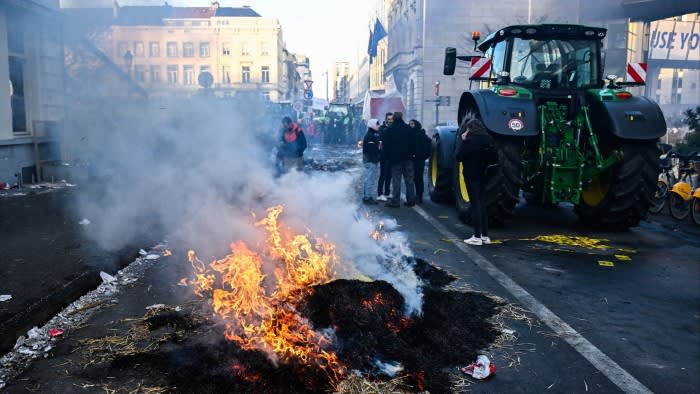Unlock the Editor’s Digest for free
Roula Khalaf, Editor of the FT, selects her favourite stories in this weekly newsletter.
Brussels has scrapped a recommended target for cutting agricultural greenhouse gas emissions as EU governments seek to quell protests from farmers against the bloc’s ambitious green agenda.
A road map on how to cut emissions by 90 per cent by 2040, due to be published by the European Commission on Tuesday, no longer includes a reference to a 30 per cent reduction target in methane, nitrogen and other gases linked to farming, three EU officials involved in the discussions told the Financial Times.
The move follows widespread demonstrations by farmers in France, Germany, Belgium and, most recently, Italy involving roadblocks, statues being torn down and riot police being deployed. Resistance to Brussels’ environmental rules has been fuelled by a perception that urban policymakers are ignoring rural areas — a sentiment on which the far-right has sought to capitalise in the run-up to elections for the European parliament in June.
Italian farmers marched to Rome on Monday evening in protest against imports of cheap food from outside the EU and called for tax breaks to be reinstated.
The ferocity of the protests has taken governments by surprise — including during a summit of EU leaders in Brussels last week.
In a bid to appease the farmers, Ursula von der Leyen, commission president, has launched “strategic dialogues”, allowed for land that was meant to be left aside for nature conservation to be farmed instead and for capitals to introduce restrictions on some Ukrainian agricultural imports.
Von der Leyen, as well as other politicians seeking re-election, are increasingly concerned that farmers will turn hostile at the ballot box and vote in far-right parties, rather than the centre-right forces they have traditionally backed.
In a letter to the commission on Monday, the Greens said farmers were “trapped in a system that was crushing them” and Brussels should propose measures including a windfall tax on agri-food companies to support them.
The 2040 target document is meant to set out what paths the bloc could take to reduce emissions, to bring about “a new industrial revolution” and to become carbon-neutral by 2050, in line with international commitments.
Agricultural activities, which account for 10 per cent of the bloc’s emissions, were initially billed as “one of the core areas to reduce EU greenhouse gas emissions by 2040”, according to a draft seen by the FT.
Policies should address the food sector as a whole rather than farming “in isolation”, the draft added, noting that large proportions of emissions could be reduced through cutting food waste, changing the chemical composition of fertilisers, and encouraging consumers to eat less carbon-intensive foods.
EU climate commissioner Wopke Hoekstra told the FT last month that the bloc must avoid a “false narrative” that industries will have to suffer as a result of climate policy.
In a separate draft assessment of the bloc’s climate transition trajectory, the commission spelt out that the lack of progress in cutting agricultural emissions is “a concern, calling for a gear change”.
Climate Capital
Where climate change meets business, markets and politics. Explore the FT’s coverage here.
Are you curious about the FT’s environmental sustainability commitments? Find out more about our science-based targets here

Emily Foster is a globe-trotting journalist based in the UK. Her articles offer readers a global perspective on international events, exploring complex geopolitical issues and providing a nuanced view of the world’s most pressing challenges.








